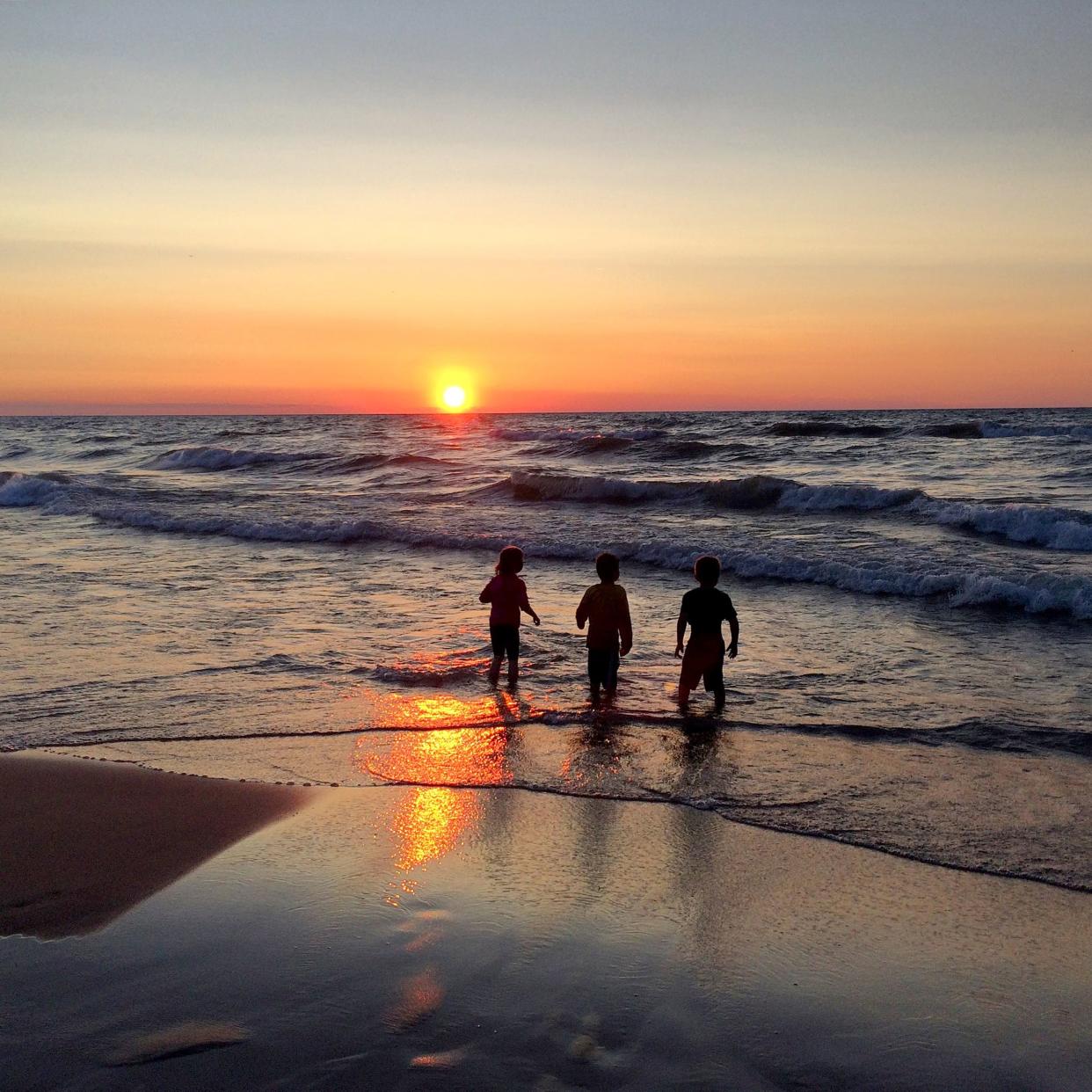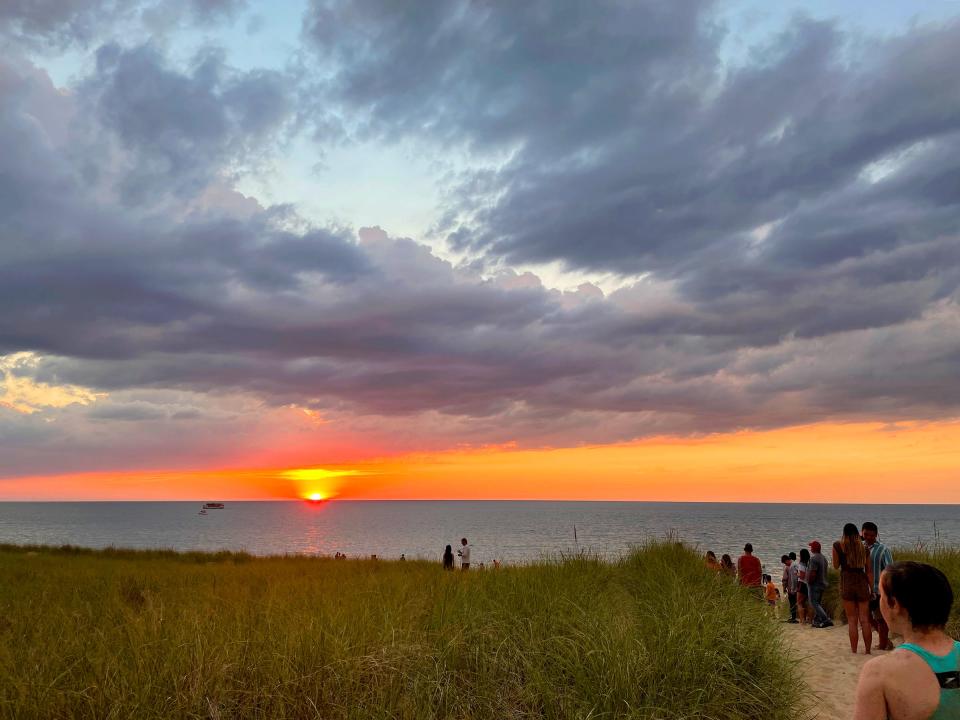'A race to the bottom': Indiana wetlands bill could affect Great Lakes, Mississippi River

Millions of acres of wetlands across the country lost protections that existed under the Clean Water Act after a U.S. Supreme Court ruling last year left it up to states to decide the extent of wetlands protection.
Conservation groups and water policy experts feared that the Sackett v. Environmental Protection Agency ruling would create a patchwork of state protections, threatening water quality in both the Great Lakes and Mississippi River watersheds.
Now they say that fear is becoming a reality with a new bill fast-tracked through the Indiana Legislature and signed into law Monday by Indiana Governor Eric Holcomb, a Republican.
The bill, known as House Bill 1383, will roll back protections for many of Indiana’s most regulated wetlands, making the permitting process easier for developers to build on them. The state's building industry has been leading the charge to strip safeguards, IndyStar.com has reported, arguing such regulations create roadblocks to meeting Indiana’s housing needs.
But environmental advocates warn that these changes could have impacts far beyond Indiana.
Water that falls across the Hoosier State eventually ends up in two of the nation’s major water bodies: the Great Lakes and Mississippi River. The state hugs 45 miles of Lake Michigan’s shoreline and is home to the headwaters of the Maumee River, which flows into Lake Erie and is the largest river basin in the Great Lakes. Across the rest of the state, water ends up in the Ohio River – a major tributary of the Mississippi.
Wetlands act as nature’s kidneys by filtering out pollutants and sediment before they head downstream. They can slow flooding during extreme rain events and, conversely, delay the onset of drought. Wetlands are also important habitats for migratory birds and waterfowl as well as spawning grounds and nursery areas for fish.
States' reactions to the Sackett decision have largely been in step with how they've acted toward wetland regulation in the past, said Marla Stelk, executive director of the National Association of Wetland Managers. While some have rolled back wetland protections, others have beefed theirs up.
But water isn't confined to state boundaries. If one state weakens or gets rid of protections, it'll affect others — and in this case, that would include Wisconsin.
More: What to know about wetlands and where you can find them along Lake Michigan

Indiana bill touted as a compromise, but environmentalists disagree
Indiana has the most polluted rivers and streams in the country, according to a 2022 report by the Environmental Integrity Project. Regardless, state lawmakers have been nibbling away at wetland protections for years, said Dan Boritt, executive director of the Indiana Wildlife Federation.
Indiana has three wetland classifications. In 2021, state lawmakers got rid of permitting requirements for Class I wetlands, the lowest quality wetlands, which are in relatively disturbed areas. Lawmakers also reduced permitting requirements for Class II wetlands, which support habitat, but do not contain rare or threatened species.
Before the 2021 bill, Indiana had already lost 85% of its wetlands in the last 50 years, and it’s lost more since then.
More: Advocates say wetlands bill is flying through legislature to 'quiet public outcry'
The new bill targets Class III wetlands, which are found in relatively undisturbed settings or house rare, threatened or endangered species. These wetlands have the highest protections in the state, and as such, developers need a state permit to build anything on them. The bill would reclassify many into Class II.
During testimony on the bill, IndyStar reported, the CEO of the Indiana Builders Association testified that his organization would prefer lawmakers go the route of North Carolina, which eliminated state protections for wetlands last year.
As such, the bill has been touted as a compromise between the building industry and environmentalists. But state water regulators have sharply criticized that portrayal, according to a recent IndyStar report. Those regulators said wetlands program staff were not invited to summer meetings between the Indiana Department of Environmental Management and representatives of the building industry, nor were environmental advocates or conservation groups.
More: ‘IDEM saying it’s a good bill is a lie’: state water regulators denounce wetlands bill
Wisconsin would need to pick up slack to keep Lake Michigan clean
During the Sackett case, a dozen scientific societies from around the world filed an amicus brief stating the importance of wetlands and how all water is interconnected.
Not only do wetlands improve water quality, but they capture excess water during heavy precipitation and slow it down, protecting communities and shorelines from flooding and erosion. At a time when many Great Lakes communities are trying to bolster coastal resilience in the face of climate change, this ecosystem service is increasingly valuable.
Wisconsin and Michigan — which have stiffer wetland protections — share Lake Michigan with Indiana, so anything Indiana does will affect everyone, said Melissa Scanlan, director of the Center for Water Policy at the University of Wisconsin-Milwaukee. According to Boritt, Illinois is currently crafting legislation to enshrine protections for wetlands.
The states that share that water will have to “pick up the slack” to keep it clean, said Brian Vigue, policy director at Audubon Great Lakes.
Laws that diminish water quality in Lake Michigan would also impact tribes, Scanlan said. While many of Wisconsin’s tribes are concentrated in the northern part of the state, part of Lake Michigan falls within the ceded territories where Ojibwe tribes have treaty rights to hunt, fish and gather. Treaty rights are federally protected, and can only be maintained if the water is healthy enough to support fish populations.
Vigue said that losing wetlands and their capacity to capture excess nutrients also would likely exacerbate the toxic algal blooms that have intensified in Lake Erie, threatening drinking water, recreation and businesses that rely on the lake. Phosphorus runoff from the Maumee River, which begins in Fort Wayne, Indiana, is largely to blame for the blooms.
And it's not just water. Indiana's decisions also could affect wildlife throughout the watershed, Boritt said, including the more than 80 species of Great Lakes fish that rely on wetlands to spawn, feed or protect their larvae.
More: Wetlands were everywhere on the Great Lakes, how one project is helping save them
Flooding exacerbated by wetland loss could cost communities millions
Indiana's water makes its way into the Mississippi River by way of the Ohio River, which dumps into the Mississippi at Cairo, Illinois. It's estimated that half of the water that flows past New Orleans originates in the Ohio.
River advocates worry that weakened wetland protections in Indiana will mean more trouble in the Ohio and, ultimately, the Mississippi — both of which already struggle with water quality issues.
"The people losing out the greatest are those that are downstream from these states that decide to decrease their level of protection," said Stelk, with the National Association of Wetland Managers.
Earlier this month, another state in the Mississippi River basin — Tennessee — proposed a significant rollback of wetland protections, the Daily Memphian reported.
These rollbacks encourage "a race to the bottom," Stelk said.
Scanlan believes that in the next few years there will be more conversations about how to cut wetland protections, and the consequences will be far-reaching. Flooding exacerbated by wetland loss could cost communities millions per year in cleanup and disaster relief efforts.
Even states that do want to bolster wetland protections have little money to do so, Stelk said, something that will have to change if the federal government hopes states will make up for the federal protections that were lost after the Sackett decision.
She also pointed out that any efforts to improve the health of shared bodies of water through good wetland management won't work piecemeal. Those kinds of efforts "have to be done in a regional approach," she said.
The reason that the government started to protect waterways and establish the Clean Water Act, was because people had polluted them so much that they were unsafe, Borrit said.
Every time wetlands are removed or protections are cut back, he said, “we are inching closer to that scenario again."
Caitlin Looby and Madeline Heim are environment reporters through Report for America that write about the Great Lakes and Mississippi River, respectively. Reach Caitlin at clooby@gannett.com or follow her on X @caitlooby.
Please consider supporting journalism that informs our democracy with a tax-deductible gift to this reporting effort at jsonline.com/RFA or by check made out to The GroundTruth Project with subject line Report for America Milwaukee Journal Sentinel Campaign. Address: The GroundTruth Project, Lockbox Services, 9450 SW Gemini Dr, PMB 46837, Beaverton, Oregon 97008-7105.
This article originally appeared on Milwaukee Journal Sentinel: Indiana wetlands bill could impact Great Lakes, Mississippi River

